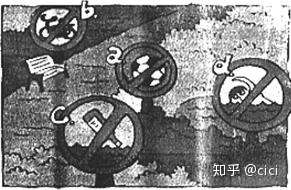ķåūx└ĒĮŌŅ}╝╝Ū╔Ęų╬÷:
1Īó╩┬īŹ(sh©¬)įāå¢Ņ}
┤╦ŅÉŅ}ą═Ą─å¢Ņ}ęįwhat�ĪówhoĪówhich����Īówhen���Īówhere����Īóhow╗“whyĄ╚į~ę²ī¦(d©Żo)���Ż¼Š═╬─ųą─│Šõ����Īó─│Č╬╗“─│ę╗Š▀¾w╝Ü(x©¼)╣Ø(ji©”)įO(sh©©)å¢▓óę¬Ū¾┐╝╔·╗ž┤Ż║╚ńŻ║
The Internet can show you a lot of jobs all over the world. If you want to find a job on the Internet, use the words “job search”or“employment”to find the websites you need.
( )What does the passage tell you to do first if you want to find a job on the Internet?
A. To type in “job search”to find the websites.
B. To write a good resume.
C. To prepare for an interview
D. To get an English dictionary
▀@╩Ūę╗Ą└Ąõą═Ą─╩┬īŹ(sh©¬)įāå¢Ņ}���Ż¼ę“?y©żn)ķ╦³Ą─┤░Ė┐╔ęįų▒ĮėÅ─╬─Č╬ųąšęĄĮ���ĪŻĖ∙ō?j©┤)Ą┌Č■ŠõįÆ����Ż¼┐╔ęįĄ├ų¬A×ķš²┤_┤░Ė�ĪŻ
ĮŌ▀@ŅÉŅ}Ą─ų„ę¬ĘĮĘ©╩ŪŻ║1. ├„┤_Ņ}ęŌĪŻ2. īżšę┤░ĖüĒį┤����ĪŻ3. šę£╩(zh©│n)ĻP(gu©Īn)µIį~ĪŻ4. Ę┤Å═(f©┤)ķåūx���ĪŻ
2�Īó═Ų└Ē┼ąöÓŅ}
╝╚ę¬Ū¾īW(xu©”)╔·═Ė▀^╬─š┬▒Ē├µ╬─ūųą┼Žó═Ų£y╬─š┬ļ[║¼ęŌ╦╝���Ż¼ėųę¬Ū¾īW(xu©”)╔·ī”ū„š▀Ą─æB(t©żi)Č╚���ĪóęŌłD╝░╬─š┬╝Ü(x©¼)╣Ø(ji©”)Ą─░l(f©Ī)š╣ū„š²┤_Ą─═Ų└Ē┼ąöÓŻ¼┴”Ū¾Å─ū„š▀Ą─ĮŪČ╚╚ź┐╝æ]�Ż¼▓╗ę¬╣╠╩žūį╝║Ą─┐┤Ę©╗“ė^³c(di©Żn)ĪŻ▀@ŅÉįćŅ}│Żęį╚ńŽ┬Šõ╩Į░l(f©Ī)å¢Ż║
What can you conclude(Ž┬ĮY(ji©”)šō)from this passage?
What’s the author’s attitude(æB(t©żi)Č╚)towards...?
We can infer from the passage that...
Which statement is ( not ) true?
ū÷▀@ŅÉŅ}ę¬Ū¾┐╝╔·į┌ķåūx═¼Ģr����Ż¼ūźūĪ╬─š┬Ą─ų„Ņ}║═╝Ü(x©¼)╣Ø(ji©”)�Ż¼Ęų╬÷╬─š┬ĮY(ji©”)śŗ(g©░u)�Ż¼Ė∙ō■(j©┤)╔ŽŽ┬╬─ā╚(n©©i)į┌┬ō(li©ón)ŽĄŻ¼═┌Š“╬─š┬Ą─╔Ņīė║¼┴x����ĪŻŲõ┤╬Ż¼ī”ė┌░Ą║¼į┌╬─š┬ųąĄ─╚╦╬’Ą─ąą×ķäėÖC(j©®)���Īó╩┬╝■ųąĄ─ę“╣¹ĻP(gu©Īn)ŽĄ╝░ū„š▀╬┤čį├„Ą─āAŽ“���ĪóęŌłD���ĪóæB(t©żi)Č╚����Īóė^³c(di©Żn)Ą╚ę¬▀M(j©¼n)ąą║Ž║§▀ē▌ŗĄ─┼ąöÓ����Īó═Ų└ĒĪóĘų╬÷���Ż¼▀M(j©¼n)ę╗▓Į╝ėÅŖ(qi©óng)└ĒĮŌ�Ż¼ūźūĪīŹ(sh©¬)┘|(zh©¼)ąįĄ─¢|╬„ĪŻ╚ńŻ║
Once there was something wrong with a machine in a factory. The workers could do nothing but turn to a German engineer for help, who drew a line on it and said, “Take off the part where the line is and change it for a new one.”The machine, with a new line on, began running well again. The engineer then asked for $ 30,000 for what he had done. The following were what he wrote on a bill, “The new part only costs one dollar, and knowing where the problem with the machine is costs $ 29,999.”
( )What can you conclude from this passage?
A. the engineer asked for too much money
B. the workers should pay the money
C. the knowledge is worth money
D. the new part could cost more
▀@Ų¬Č╠╬─╩Ūū„š▀ųvĄ─ę╗éĆ╣╩╩┬�Ż¼─Ū├┤═©▀^▀@éĆ╣╩╩┬╬ęéā┐╔ęį┼ąöÓ│÷╩▓├┤─ž?ļm╚╗ū„š▀ø]ėąčį├„Ż¼Ą½╩Ū╬ęéā┐╔ęįöÓČ©�Ż¼░l(f©Ī)¼F(xi©żn)å¢Ņ}Ą─╦∙į┌ąĶę¬ųŪ╗█║═ų¬ūRŻ¼ų¬ūR╩Ūäō(chu©żng)įņārųĄĄ─į┤╚¬����Ż¼ę“┤╦┤╦Ņ}Ą─š²┤_┤░Ėæ¬(y©®ng)×ķCĪŻ
3���ĪóöĄ(sh©┤)ō■(j©┤)═Ų╦ŃŅ}
┤╦Ņ}ę¬Ū¾īW(xu©”)╔·Š═╬─š┬╠ß╣®Ą─öĄ(sh©┤)ō■(j©┤)�Ż¼ęį╝░öĄ(sh©┤)ō■(j©┤)┼c╬─ųąŲõ╦¹ą┼ŽóĄ─ĻP(gu©Īn)ŽĄū÷║åå╬ėŗ(j©¼)╦Ń║══ŲöÓ�ĪŻ
Visit Swansea Zoo
Come and see the Indian elephants and the new tigers from America. The bears are waiting to meet you, and the monkeys from China are waiting to throw things at you. The lovely dogs from Australia are waiting to laugh at you, and the giraffes from Zambia are waiting to look down on you.
TicketsOpening time
Grown-ups: $ 39:00 am ––– 4:00 pm
Children: Over 12:$2except Friday
Under 12: Free10:00 am –– 3:00 pm
( )1. How much does Mr Smith have to pay if he visits the zoo with his sons of fourteen and ten?
A. $2.00b. $5.00C. $4.00D. $3.00
( )2. Which of the following is the visiting time?
A. 8:30 am, WedB. 9:30 am, Fri
C. 3:00 pm, SunD. 4:00 pm, Tue
ū÷┤╦ŅÉŅ}ę╗ę¬ūźūĪėąĻP(gu©Īn)Ą─öĄ(sh©┤)ō■(j©┤)Ż¼Č■ę¬Å─▒ŖČÓĄ─ą┼Žóųąšę│÷─Ūą®ėąė├Ą─ą┼Žó���Ż¼╚²ę¬ūźūĪę╗ą®ĻP(gu©Īn)µIį~����ĪŻīŹ(sh©¬)ļH╔Ž����Ż¼╔Ž╩÷ā╔Ņ}Č╝┐╔┐┤ū„öĄ(sh©┤)ō■(j©┤)═Ų╦ŃŅ}����Ż¼ę╗Ņ}╩Ū╦ŃÕX�Ż¼┴Ēę╗Ņ}╩Ū╦ŃĢrķgĪŻ
═©▀^ķåūx╬ęéā░l(f©Ī)¼F(xi©żn)▓╝ĖµųąĄ─╦∙ėąöĄ(sh©┤)ō■(j©┤)Č╝╩Ūėąė├Ą─����Ż¼─Ū├┤ĻP(gu©Īn)µIį~╩ŪŻ║grown-ups, children, over 12, under 12, opening time, except FridayĪŻĄ┌ę╗Ņ}ųąMr Smith╩Ū│╔╚╦���Ż¼ĒÜ┘I3ēKÕXĄ─ķTŲ▒�Ż¼╦¹ę╗éĆ14ÜqĄ─ā║ūėąĶ┘I2ēKÕXĄ─ķTŲ▒���Ż¼┴Ēę╗éĆ▓╗ØM12ÜqĄ─ā║ūė┐╔├ŌŲ▒����Ż¼╦∙ęįMr SmithŽ╚╔·ąĶ╗©5ēKÕX�Ż¼B╩Ūš²┤_┤░Ė���ĪŻĄ┌Č■Ņ}C╩Ūš²┤_┤░Ė����ĪŻ
4Īóų„ų╝┤¾ęŌŅ}
┤╦ŅÉŅ}ą═ė├ęį┐╝▓ķīW(xu©”)╔·ī”╬─š┬ų„Ņ}╗“ųąą─╦╝ŽļĄ─ŅI(l©½ng)Ģ■║═└ĒĮŌ����ĪŻ╚ńŻ║
What does the passage mainly talk about?
What is the main idea of this passage?
What does the writer want to tell us?
What is the best title of this passage?
├┐ę╗Ų¬╬─š┬Č╝ėą╦³Ą─ų„Ņ}ŠõŻ¼Č°├┐ę╗éĆČ╬┬õę▓Ė„ėąų„Ņ}Šõ�Ż¼╦³ę╗░ŃČ╝ė├üĒ▒Ē╩Šę╗Ų¬╬─š┬╗“ę╗éĆČ╬┬õĄ─ų„ų╝┤¾ęŌĪŻę“┤╦���Ż¼šę│÷╬─š┬║═Ė„Č╬┬õĄ─ų„Ņ}Šõ(═∙═∙×ķĄ┌ę╗Šõ╗“ūŅ║¾ę╗Šõ)╩ŪĮŌŅ}Ą─ĻP(gu©Īn)µI�ĪŻūźūĪ┴╦ų„Ņ}Šõ�Ż¼╬─š┬Ą─ūŅ╝čś╦(bi©Īo)Ņ}ę▓Š═▓╗ļy┤_Č©┴╦ĪŻ╚ńŻ║═Ų└Ē┼ąöÓŅ}──ę╗╣Ø(ji©”)ųąĄ─└²╬─╬ęéāĮo╦³ŲéĆ╩▓├┤ś╦(bi©Īo)Ņ}║├─ž?╬ęéāį┌╦³║¾├µį┘╝ė╔Žę╗Č╬įÆŻ║
One dollar for changing a new part sounds reasonable(║Ž└ĒĄ─), but the $ 29,999 is exactly the value of wisdom and knowledge.
( )The best title for the passage should be ________ .
A. The Value of Knowledge
B. Helpless Workers
C. The Expensive Machine
D. The Lucky Factory
╬─ųąĄ─ūŅ║¾ę╗Šõ╩Ūš¹Ų¬╬─š┬Ą─ų„Ņ}Šõ���Ż¼ę▓Š═╩Ū╬─š┬Ą─ś╦(bi©Īo)Ņ}�Ż¼╝┤Ż║The Value of Knowledge“ų¬ūRĄ─ārųĄ”���Ż¼A×ķš²┤_┤░Ė���ĪŻ
5ĪóĮø(j©®ng)“×(y©żn)│ŻūRŅ}
┤╦ŅÉŅ}ų„ę¬╩Ū┐╝▓ķųąīW(xu©”)╔·æ¬(y©®ng)ėąĄ─ČÓĒŚ(xi©żng)ŠC║Žų¬ūR�Ż¼░³└©Ż║╔ńĢ■Īó╠ņ╬─Īó╩ĘĄž�Īó┐ŲŲš╝░╔·╗Ņ│ŻūRĄ╚ĪŻ┤╦ŅÉŅ}═∙═∙┼c╬─š┬ø]ėąų▒ĮėĻP(gu©Īn)ŽĄ���Ż¼īW(xu©”)╔·ų╗─▄æ{ūį╝║Ą─│ŻūR▀M(j©¼n)ąą┼ąöÓ�Ż¼╚╗║¾ū÷│÷Ę¹║ŽęÄ(gu©®)┬╔Ą─š²┤_▀xō±�ĪŻ╚ńŻ║
( )We can guess when a giraffe sees a tiger ______ .
A. it will run away as fast as possible
B. it will run to eat the tiger
C. it will make the tiger bring it something to eat
D. it will make one of the smallest animals bring the tiger something to eat
▀@Š═╩Ūę╗Ą└┐╝▓ķ│ŻūRĄ─Ņ}Ż¼ķLŅi┬╣┐┤ĄĮ└Ž╗ó«ö(d©Īng)╚╗╩Ū▒M┐ņ┼▄ķ_����Ż¼╣╩A╩Ūš²┤_┤░ĖĪŻ
6�Īó╚╬äš(w©┤)ą═ķåūx
╚╬äš(w©┤)ą═ķåūx╩ŪĮ³Äū─ĻļSų°╚╬äš(w©┤)ą═Į╠īW(xu©”)│÷¼F(xi©żn)Ą─ą┬Ņ}ą═Ż¼╦³═∙═∙╝»ųą┴╦╔Ž├µ╦∙╩÷Ą─ÄūĘNŅ}���Ż¼ęį┐┤łD╗“ķåūx╬─š┬╠Ņ▒Ē����Ż¼╠Ņ┐šĄ╚ą╬╩Į│÷¼F(xi©żn)���ĪŻę¬Ū¾┐╝╔·═©▀^ķåūx═Ļ│╔╦∙Įo╚╬äš(w©┤)����Ī���Ż┐╝▓ķīW(xu©”)╔·ī”łD▒Ē╗“╬─š┬Ą─└ĒĮŌ│╠Č╚ęį╝░▒Ē▀_(d©ó)ūį╝║ė^³c(di©Żn)Ą──▄┴”�ĪŻšł┐┤Ž┬└²Ż║Ė∙ō■(j©┤)Ņ}─┐ę¬Ū¾═Ļ│╔╚╬äš(w©┤)���ĪŻ(2004���Ż¼▒▒Š®║ŻĄĒ)
╝┘╚ń─Ńš²į┌×ķę╗ą®ųąć°īW(xu©”)╔·ū÷ī¦(d©Żo)ė╬Ż¼ģóė^����Ż¼ė╬ė[ėóć°éÉČžĄ─ę╗éĆ╣½ł@ĪŻšł─ŃĖ∙ō■(j©┤)Ž┬├µ╣½ł@Ą─╩ŠęŌłD���Ż¼×ķ╦¹éāšf├„a����Īób���Īóc���Īód╦─ĒŚ(xi©żng)╣½ł@ęÄ(gu©®)ätĪŻ(šłīæĻP(gu©Īn)µIą┼ŽóŻ¼Šõ╩Į▓╗Ž▐���ĪŻ)

└²Ż║No recorders, please.
62. Sign a: ________________________
Sign b: ___________________________
63. Sign c :_________________________
Sign d: ____________________________
▀@Ą└Ņ}ūī┐╝╔·▒µšJ(r©©n)łDś╦(bi©Īo)����Ż¼╩Ūę╗Ą└│ŻūR║═ūRłDĮŌęŌŽÓĮY(ji©”)║ŽĄ─Ņ}����Ż¼═¼Ģrę▓╩ŪūxīæĮY(ji©”)║ŽŅ}ĪŻ═©▀^┐╝╔·╦∙īæ╬─ūų┼ąöÓ╦¹ī”łDĄ─šJ(r©©n)ūR│╠Č╚║═Ė∙ō■(j©┤)šZčį╣”─▄įņŠõĄ──▄┴”�ĪŻ▒ŠŅ}┤░Ė╚ńŽ┬Ż║
Sina a: Don’t play football here!
Sign b: No bikes here!
Sign c: Don’t throw bottles into the lake
Sign d: No swimming!
ĪĪĪĪ ÜgėŁ╩╣ė├╩ųÖC(j©®)ĪóŲĮ░ÕĄ╚ęŲäėįO(sh©©)éõįLå¢ųą┐╝ŠW(w©Żng)����Ż¼2023ųą┐╝ę╗┬Ę┼Ń░ķ═¼ąąŻĪ>>³c(di©Żn)ō¶▓ķ┐┤










